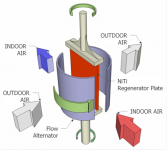Elastic Metal Alloy Refrigerants

Technology Description:
The University of Maryland (UMD) is developing an energy-efficient cooling system that eliminates the need for synthetic refrigerants that harm the environment. More than 90% of the cooling and refrigeration systems in the U.S. today use vapor compression systems which rely on liquid to vapor phase transformation of synthetic refrigerants to absorb or release heat. Thermoelastic cooling systems, however, use a solid-state material—an elastic shape memory metal alloy—as a refrigerant and a solid to solid phase transformation to absorb or release heat. UMD is developing and testing shape memory alloys and a cooling device that alternately absorbs or creates heat in much the same way as a vapor compression system, but with significantly less energy and a smaller operational footprint.
Potential Impact:
If successful, the UMD's technology could help displace traditional cooling systems that rely on polluting refrigerants.
Security:
Increased energy efficiency would decrease U.S. energy demand and reduce reliance on fossil fuels—strengthening U.S. energy security.
Environment:
Eliminating refrigerants with polluting emissions could account for up to 10%-20% of global warming by year 2050. UMD's technology could eliminate the use of these refrigerants.
Economy:
Widespread adoption of this technology could increase energy efficiency of air conditioners and refrigerators—providing consumers with cost savings on energy bills.
Contact
ARPA-E Program Director:
Dr. Christopher Atkinson
Project Contact:
Prof. Ichiro Takeuchi
Press and General Inquiries Email:
ARPA-E-Comms@hq.doe.gov
Project Contact Email:
takeuchi@umd.edu
Partners
United Technologies Research Center
Related Projects
Release Date:
03/02/2010
